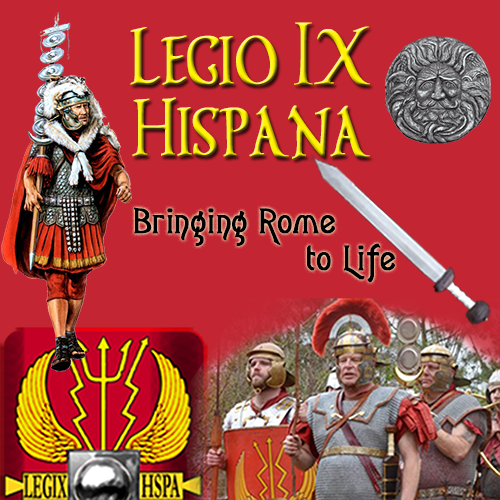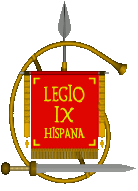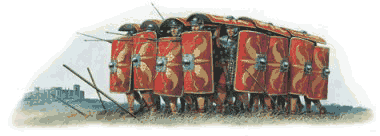Paenula (cloak)
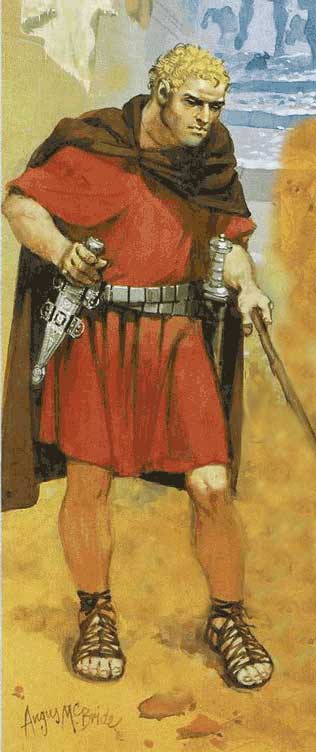 There were two types of cloak in use by the Roman Army, the sagum and the
paenula. Both types of cloak seem to have been
some shade of brown or yellowish-brown in color; apparently a particular type of wool was preferred, its
natural oils making the fabric nearly waterproof. On campaign, the cloak doubles as the soldier's bedroll.
There were two types of cloak in use by the Roman Army, the sagum and the
paenula. Both types of cloak seem to have been
some shade of brown or yellowish-brown in color; apparently a particular type of wool was preferred, its
natural oils making the fabric nearly waterproof. On campaign, the cloak doubles as the soldier's bedroll.
Paenula
We believe that the paenula may have been semi-circular, circular, or oval. A circular or semi-circular pattern should be at least 45" in radius, and can be made from 2 or more pieces sewn together with a flat overlap seam. An oval should be about 60" wide by about 3 yards long. In any case, the paenula should be knee-length or longer. A semi-circle is closed at the front either with pins, toggles, or hooks. A circle or oval has a neck hole (ca. 6" diameter) and the front is slit open, partway or all the way to the neck opening, with similar closures. The paenula can have a hood about 12" square sewn to the neck hole, or to a semi-circular cutout in the straight edge of the semi-circular type.
Fibulae
Brooches or pins called fibulae were used to pin shut tunics and cloaks, and came in a wide variety of styles. Most were bronze, but iron, silver, and gold are known, and decoration included enamel inlay. Some types, like the "trumpet" brooch, could be worn in pairs connected by a chain. It is possible that straight pins or even large thorns were used as fibulae.
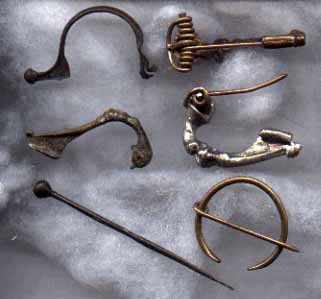 At left are 3 original
items, a bow brooch, a trumpet brooch (both missing their pins), and a hairpin. At right are two reproduction trumpet
brooches, shown from the bottom and from the side, and a simple penannular brooch. Penannulars are very popular among
reenactors because they are very easy to make (two pieces of bent brass rod), but the more complex styles of fibulae were
far more common in ancient times. (Thanks to Matt Amt of Legio XX for the use of this bit on the fibulae)
At left are 3 original
items, a bow brooch, a trumpet brooch (both missing their pins), and a hairpin. At right are two reproduction trumpet
brooches, shown from the bottom and from the side, and a simple penannular brooch. Penannulars are very popular among
reenactors because they are very easy to make (two pieces of bent brass rod), but the more complex styles of fibulae were
far more common in ancient times. (Thanks to Matt Amt of Legio XX for the use of this bit on the fibulae)
Sagum
![]() The sagum is rectangular, blanket-sized or larger. It is simply pinned with a fibula at the shoulder or throat. The sagum was a garment
of note generally worn by members of the Roman military during both the Republic and early Empire. Regarded symbolically as a garment
of war by the same tradition which embraced the toga as a garment of peace,it was slightly more practical in any event, consisting
of a simple rectangular segment of cloth fastened by a leather or perhaps metal clasp and worn on top of the armor. The fabric was
made of unwashed wool, saturated with lanolin (which made it water-resistant).
The sagum is rectangular, blanket-sized or larger. It is simply pinned with a fibula at the shoulder or throat. The sagum was a garment
of note generally worn by members of the Roman military during both the Republic and early Empire. Regarded symbolically as a garment
of war by the same tradition which embraced the toga as a garment of peace,it was slightly more practical in any event, consisting
of a simple rectangular segment of cloth fastened by a leather or perhaps metal clasp and worn on top of the armor. The fabric was
made of unwashed wool, saturated with lanolin (which made it water-resistant).

